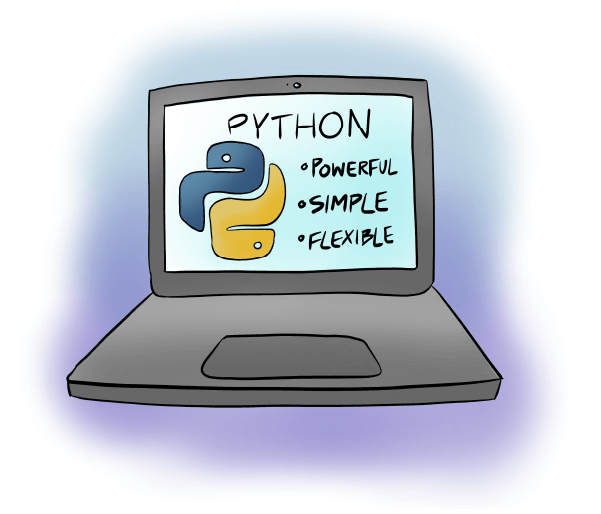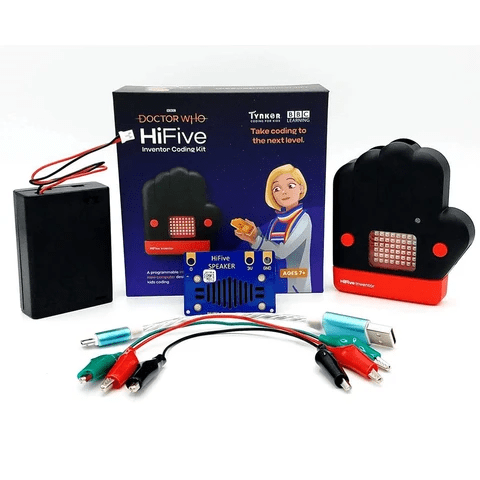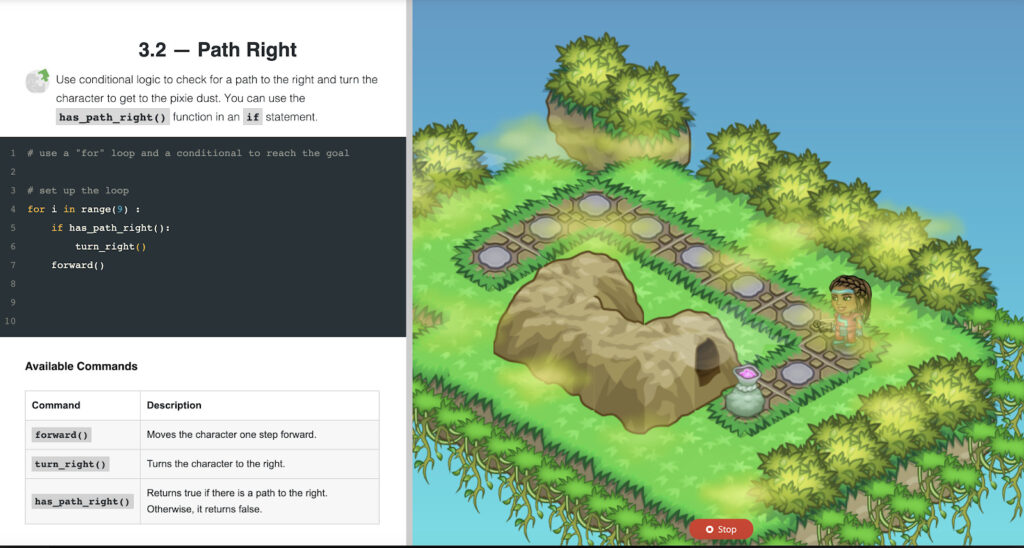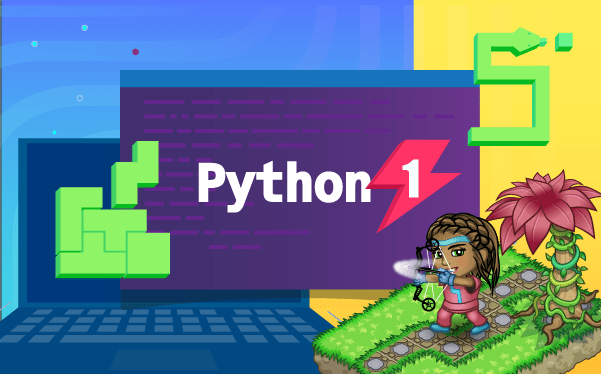What can we do as parents to prepare our children for the many academic challenges at school while setting them up for successful careers? One answer is clear: Coding. Let’s look at programming courses that teach Python and see how coding can transform your child from consumer to creator.
What Is Python?
Python is the text-based programming language used by millions of professional coders at places like Google, IBM, and even NASA!
United Space Alliance’s Senior Project Engineer, Robin Friedrich, was tasked with finding a better way to handle data management on NASA’s shuttle missions and quickly discovered that Python was the answer. “Things just work the first time,” says Friedrich. “No other language exhibits that trait like Python.

Python is fast enough for our site and allows us to produce maintainable features in record times, with a minimum of developers.
According to Cuong Do, a Software Architect at YouTube.com:
Due to it being stable, secure, and flexible, Python’s straightforward syntax is the preferred language of Data Science professionals around the world, many of whom are developing groundbreaking Artificial Intelligence and Machine Learning applications. Python is also used in image processing and graphic design applications for 2D imaging software and 3D animation.
But why would my kid be motivated to learn Python? According to the UpGrad Blog, “Python is the foundation for popular games like Battlefield 2, Frets on Fire, World of Tanks, Disney’s Toontown Online, Vega Strike, and Civilization-IV.” Enough said? Probably, but there’s so much more!
Is Learning Python Easy?
It’s a Perfect First Programming Language. The rules of Python syntax are simple enough for anyone to learn, even coders as young as 9 or 10.
Tynker offers a great live one-on-one class with a private teacher for ages 12+ in which kids can solve real-world problems in math and science, design games, & more.
Why Is Learning Python Important?
Worldwide Use in the High-Tech Industry. While Python can be used for simple tasks, millions of working programmers make a living writing Python every day.
Academics, data journalists, and researchers use Python too. The US Department of Labor estimates faster-than-average growth in hiring—predicting over half a million in new hires in tech over the next 10 years at fantastic salaries.
Why Should a Kid Learn Python?
Create Anything You Imagine. Want to make games? Create a website or cool digital art? No matter what makes you excited about computer programming, Python’s wide variety of modules (also called libraries) make creating applications fast.
For example:
- Draw using Turtle Graphics
- Manipulate images with Processing.py
- Make charts and plots with Matplotlib,
- Find hundreds of useful modules to help you accomplish any task you want.
- You can even use Python to take control of hardware gadgets like the BBC Micro:bit or Doctor Who Inventor Coding Kit.

What Is Python Used For?
Explore Data Science
Python is also used in the world of Data Science, where analysts try to uncover patterns and gain insight into the data all around us. Take Tynker’s Data Science 1 course and prepare for what some call “America’s Hottest Job!”
Prepare for College
Python is king — it’s the most popular language choice for introductory college Computer Science courses. Get ready for college by learning Python — and of course, once you have one programming language under your belt, you can quickly learn more.
Can a Kid Learn Python?
Yes! A kid’s brain is like a sponge, absorbing information at a fast rate. Just like a foreign language, learning a text language like Python is best learned at an early age. Plus, Python is easy to learn, whether your kid has programming experience or not.
Python’s Welcoming Community
Learning alone can be hard. That’s why the Python community has a beginner-friendly attitude. Meet-ups, online communities, professional development, documentation and free tutorials, and much more are available worldwide.
More than that, you’ll be able to make connections with hundreds of thousands of first-time Python learners, just like you. Maybe you’ll even go to PyCon, the international meetup of Python developers and educators.
Tynker’s Community allows you to share your Python projects and quickly get feedback and ideas for improvement!
What Is the Best Age to Learn Python?
Kids can learn to code Python as early as elementary school. Here’s how they can get started:
Type Everything. You might be tempted to copy and paste out of a book or tutorial, but you should get familiar with typing by hand. Remember: Python is strict. You must be precise with spelling, punctuation, and even white space!
Try it out! Want to know how a particular function or programming idea works? Try it out in a short program. You can’t break the computer, so just run some short experiments.
Go Easy on Yourself. Unlike other tasks you might do in school, it’s very common to write an incorrect program the first, second, or third time! Be patient and expect to make mistakes.
Start Small. Looking to make games? Simple, old-school arcade games from the 1970s and 80s are a great start for beginners: Research and recreate classics like Space Invaders, Pong, and Centipede.
Don’t underestimate the satisfaction of actually completing a working prototype! Whether you’re coding a game or a different kind of project, try to create the “Minimum Viable Product” for your idea.
Make a Plan. When you start writing original programs, begin the process by working with pen-and-paper. For example, you might restate the purpose of your program in your own words.
Think about the program’s inputs and outputs. Write them down. Think about which variables are needed to complete the program. Give them meaningful names, so that the name helps someone reading the code understand the value that’s represented by each variable.
Divide and Conquer. Break the program down into small parts. For each small part or feature, write the code that accomplishes that feature. As you write your code, add comments describing each code segment’s purpose.
Test Everything, Line by Line. Test your code as soon as you write it to cover all possibilities — try all the different inputs that a user or player might attempt. Once everything is working, think about what single feature you want to implement next. Write some more code, and test that feature, too.
Feeling Stumped? Take a break, take a walk, or get a good night’s sleep and return to your code. The best debugger is a well-rested mind.
What Are the Best Python Courses for Kids?
Research shows that gamified courses and activities offered by companies like Tynker work best because when kids have fun, they’re motivated to see projects through to completion. In addition, they can pick up key fundamental coding concepts along the way, such as loops, conditionals, and syntax.

For example: Tynker offers Python 101, an engaging interactive course suitable for readers of any age. Start by solving movement puzzles and brushing up on core coding concepts — before you know it, you’ll be designing games like Snake, Frogger, and Tetris (available to all Tynker users).
What is The Best Way for Kids to Learn Python?
- Python.org – a great source for all things Python.
- Tynker – self-paced gamified courses and activities inspire kids to create their own video games, art, and websites with Python.
- Udemy – a selection of Python courses, classes, and bootcamps.
- Codecademy – online Python courses and forums.
- CodeWizardsHQ – online coding classes with a live instructor.
- Hour of Python – free Python lessons and string challenges from Trinket.
- HackInScience – free Python exercises.
- Real Python – Articles, podcasts, tutorials, and tricks for Python fans.
- Python Tutor – Visualize your Python code’s execution, step-by-step.
- Invent with Python – Free Python books for beginners.
Your child will love discovering the many benefits of using Python, and you’ll love that they’re learning valuable real-world skills that will prepare them for AP Computer Science, college, and maybe even a rewarding creative career.
Check out Tynker’s Curriculum and learn more about inspiring the next generation to change the world through code.





